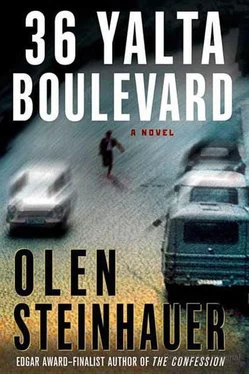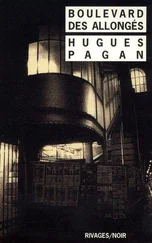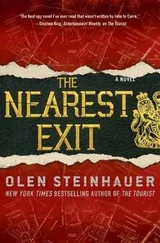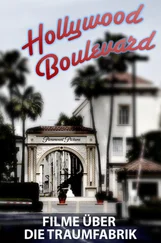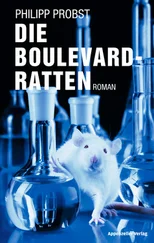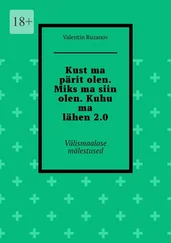Olen Steinhauer - 36 Yalta Boulevard
Здесь есть возможность читать онлайн «Olen Steinhauer - 36 Yalta Boulevard» весь текст электронной книги совершенно бесплатно (целиком полную версию без сокращений). В некоторых случаях можно слушать аудио, скачать через торрент в формате fb2 и присутствует краткое содержание. Жанр: Политический детектив, на английском языке. Описание произведения, (предисловие) а так же отзывы посетителей доступны на портале библиотеки ЛибКат.
- Название:36 Yalta Boulevard
- Автор:
- Жанр:
- Год:неизвестен
- ISBN:нет данных
- Рейтинг книги:3 / 5. Голосов: 1
-
Избранное:Добавить в избранное
- Отзывы:
-
Ваша оценка:
- 60
- 1
- 2
- 3
- 4
- 5
36 Yalta Boulevard: краткое содержание, описание и аннотация
Предлагаем к чтению аннотацию, описание, краткое содержание или предисловие (зависит от того, что написал сам автор книги «36 Yalta Boulevard»). Если вы не нашли необходимую информацию о книге — напишите в комментариях, мы постараемся отыскать её.
36 Yalta Boulevard — читать онлайн бесплатно полную книгу (весь текст) целиком
Ниже представлен текст книги, разбитый по страницам. Система сохранения места последней прочитанной страницы, позволяет с удобством читать онлайн бесплатно книгу «36 Yalta Boulevard», без необходимости каждый раз заново искать на чём Вы остановились. Поставьте закладку, и сможете в любой момент перейти на страницу, на которой закончили чтение.
Интервал:
Закладка:
“That wouldn’t be fair to your comrades.”
“Yeah,” he said. “I guess you’re right.”
Brano rubbed his sore head.
At the moment his memory stopped, he had been in an empty park with a dead body and a living man. Besides his heart, the foliage bending under the weight of Bertrand Richter, and Josef Lochert’s heavy smoker’s breaths behind him, there had been no sound. He was struck from behind.
Josef Lochert had knocked him out last night. Then he had taken Brano’s wallet and returned it to the hotel.
Not to kill him, but to leave him there for the Austrian police to pick up, beside the body of Bertrand Richter.
He didn’t know why, though that would come later, but he was sure of this story. Now he worried about where he was at this moment. On a plane, headed home.
You’re going home, Brano. Where you belong.
“I’m telling you,” said the Austrian, “You don’t look right to me at all. You need some water or something?” He waved to a stewardess, but they were already descending.
As the plane taxied to the gate, Brano watched the other passengers unbuckle their belts and reach beneath their seats for their hand luggage. A child across the aisle muttered to her mother, then turned to smile at Brano. She was missing two front teeth. Brano tried to smile back. The young Austrian said, “It’s good to be among the workers again, eh?”
Brano walked to the front of the plane as the stewardess stood up without a smile. “Please wait until we’ve opened the door.”
He nodded but remained where he was. She gave him a short look and went to the hatch to peer out the window. A man in orange work clothes was rolling metal stairs up to the plane, while behind him four men stood in leather coats, casting long shadows as the sun set. The one in the front, fatter and older than the others, raised his red face to the light. It was not Colonel Cerny but a man farther up the chain of command, the Comrade Lieutenant General. An old-guard soldier who had distinguished himself fighting the Nazis, he was now an inveterate alcoholic running the counterintelligence division.
The stewardess grunted as she unscrewed the lock, then pushed the hatch open. Brano stepped out onto the stairs. The Lieutenant General spoke to the other three men, who jogged up to wait for him at the bottom.
As he descended, he realized he knew these men as well, but peripherally. Young, hard men adept at following orders. Once he reached them, two grabbed his arms and led him across the tarmac.
“Comrade Lieutenant General,” said Brano.
The older man tugged on his collar. “Don’t comrade me, Brano. You’re in the shit now.”
He tried to control his voice. “I don’t understand. GAVRILO has been taken care of.”
“Despife you. Don’t start with your stories, okay? Lochert’s already sent in his report, and you…” The Lieutenant General shook his pink head. “I don’t even want to talk to you.” He turned and walked toward the airport.
Brano looked back at the passengers trickling out of the plane, staring in his direction. The young Austrian shielded his eyes, trying to make sense of the sick passenger who was being led away by three large men.
PART ONE: THE SHOULDER
8 FEBRUARY 1967, WEDNESDAY
He left the Capital that morning, and at ten stopped in Uzhorod to fill his petrol, then continued up into the mountains, alert to each curve hidden behind clusters of snow-sprinkled pines. A small suitcase and briefcase shivered on the passenger seat.
His name was Brano Oleksy Sev. He had reached his fiftieth year the previous month with fewer scars than he deserved, and owned the same white Trabant P50 he had bought ten years before. He had replaced so many internal parts that likely nothing inside it had come with the original car. Even the steering wheel had been replaced in 1961 (31 October, the same day Stalin’s sarcophagus was removed from its Red Square mausoleum), after he had taken a particularly sharp turn while trailing a suspect and found it sitting in his lap.
In Vranov he took lunch at the empty restaurant he knew from his last visit three years before, because this stop never changed. The waitress, a large woman with a cleft lip, frowned a lot at him. Then she leaned against the edge of the table, a faint odor of sweat misting off her cheeks, and asked if he was sure he didn’t want a drink with that. “We’ve got the best brandy in the region.”
Brano shook his head and watched her return, frowning, to the kitchen, then opened his briefcase and took out the case file with cold fingers.
Until last August, Brano had been a major in the Ministry for State Security, located on Yalta Boulevard, number 36. But for the last five months he had been a comrade-worker at the eternally noisy Pidkora People’s Factory, the third man down the assembly line, fitting electrical wires into gauges so that the machines of socialist agriculture would never fail. Then, yesterday, he felt a tap on his shoulder. His alcoholic foreman stood behind him.
Someone to see you, Sev! In my office!
Brano followed him through the jungle of machinery to the glassed-in box in the center of the factory floor. Behind the cluttered desk, holding a newspaper and smiling, sat the Comrade Colonel, Laszlo Cerny, wiping his unkempt mustache.
The foreman closed the door as he left, muffling the sound of machines.
Brano.
Comrade Colonel.
Sit down, said the colonel, tapping the newspaper on the desk. Then he held up the paper, which was Austrian. Kurier. He said, You ever meet this guy?
Who?
Filip Lutz.
Brano said he hadn’t, then began to understand. This was the way meetings at Yalta Boulevard had always begun, with pleasantries and diversions. The Comrade Colonel even read out portions of that expatriate’s slanders about the “acts of barbarity” committed by the Ministry for State Security. The lies he tells. Those Austrians will believe anything. Say, Brano, I don’t suppose you’d be interested in leaving this factory, would you?
The waitress delivered his coffee with an arched brow. “You’re up here for work?”
Brano closed the file. “How do you know I’m not from here?”
“Your accent. And your car.” She nodded at the mud-grayed window. “Those plates are from the Capital.”
“That’s very good.”
“So?”
“Yes?”
“Are you here on business?”
“You’re very curious.”
“My husband says it’ll get me into trouble one day.”
“Visiting family,” he said. “In Bobrka.”
“ Bobrka? ” She crossed her arms over her chest and raised the mottled side of her lip. “From the Capital to Bobrka. That’ll be a shock.”
“It certainly will be.”
He opened the file again as she walked away, and he looked at the top photograph, of a handsome man’s face-wide, with faint features.
This was the reason for interrupting his day’s work-Jan Soroka. Five and a half months ago, in August, this petroleum specialist had made it out of the East, to Vienna. Colonel Cerny shrugged. Through Hungary, we suspect. Their border is full of holes. Assumedly for asylum, Soroka twice visited the American embassy, then remained in Vienna for the following three months. In November, he reentered the American embassy and did not emerge again.
Well, we lost track of him at least. It happens. Just an oil rigger. Sometimes people slip through your fingers. But listen to this.
Ten days ago, Soroka had reappeared, magically, in Bobrka-his hometown, and Brano’s.
Brano had left Bobrka in 1941, so Jan Soroka was unfamiliar, as was his wife, Lia, whose puffy lips in her Galicia Textile Works identification photo made her look as if she’d just been hit. There were no photographs of their seven-year-old son, Petre.
Читать дальшеИнтервал:
Закладка:
Похожие книги на «36 Yalta Boulevard»
Представляем Вашему вниманию похожие книги на «36 Yalta Boulevard» списком для выбора. Мы отобрали схожую по названию и смыслу литературу в надежде предоставить читателям больше вариантов отыскать новые, интересные, ещё непрочитанные произведения.
Обсуждение, отзывы о книге «36 Yalta Boulevard» и просто собственные мнения читателей. Оставьте ваши комментарии, напишите, что Вы думаете о произведении, его смысле или главных героях. Укажите что конкретно понравилось, а что нет, и почему Вы так считаете.
